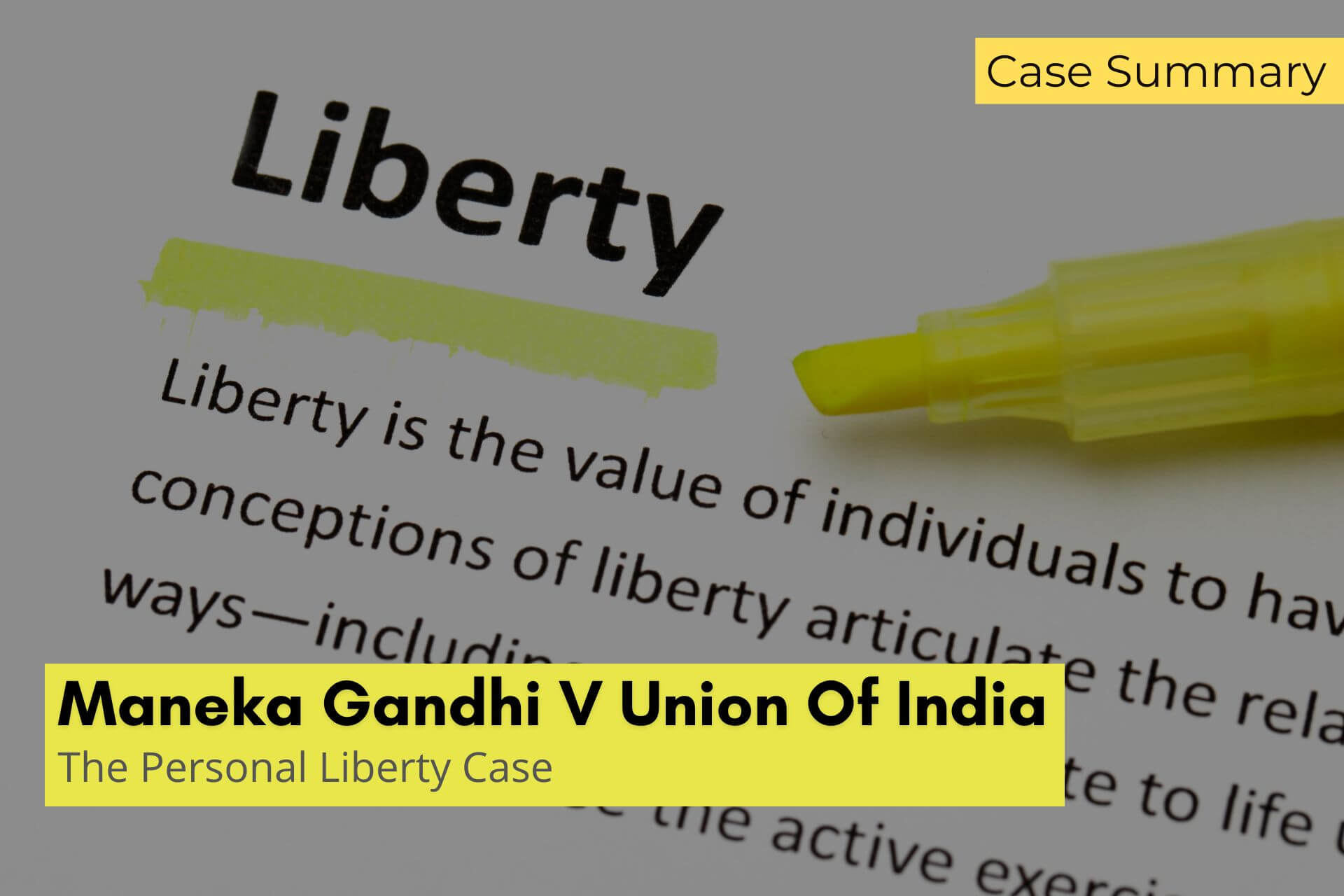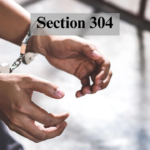
This case is important for UPSC and MPSC aspirants
Maneka Gandhi V Union Of India
Brief
Citation : (1978) 2 SCR 621 : AIR 1978 SC 597 : (1978) 1 SCC 248 : (1978) 2 SCJ 312
Court : Supreme Court Of India
Date of Decision : 25 January 1978
Judges : MH Beg CJ, NL Untwalia, PN Bhagwati, VR Krishna Iyer, S Murtaza Fazl Ali, PS Kailasam and YV Chandrachud, JJ
Petitioner : Maneka Gandhi
Respondent : Union Of India
Introduction
“Under the law of nature, all men are born free, everyone comes into the world with a right to his own person, which includes the liberty of moving and using it at his own will. This is what is called personal liberty and is given him by the Author” Thomas Jefferson. Maneka Gandhi V Union of India is a landmark judgement which holds utmost importance because of it’s impact on broadening the horizons of Article 21.
As before Article 21 only protected the Right to Life and Personal Liberty against the executive branch’s arbitrary actions and not from legislative action. This cases judgement was a stepping stone towards strengthening our Constitutions Article 14, Article 19 and Article 21 as this case opened a page of multi-dimension for Article 21 and broadened it’s horizons vastly.
Facts
The facts of this case are as follows, Maneka Gandhi was issued a passport on 1st June 1976 under The Passport Act, 1967 Maneka Gandhi on 4th of July 1977 received a letter dated 2nd July 1977 from the Regional Passport Officer, New Delhi. The letter was to inform her of the fact that the Government of India has decided to impound her passport under Section 10 (3) (c) of the Passport Act, 1967 in the name of “Public Interest”.
Maneka Gandhi was requested to surrender her passport within 7 days from the date of receipt of the letter, Maneka Gandhi immediately wrote a letter to the Regional Passport Officer, New Delhi requesting him to furnish a copy of the statement of reason provided in Section 10 (5) of the Passport Act, 1967. The Government of India on 6th July 1977 through the Ministry of External Affairs sent a reply to the request made by Maneka Gandhi, the reply stated that the Government of India decided in the interest of the general public to not to furnish her a copy of the statement of reason for making the order.
Furthermore, Maneka Gandhi filed a writ petition in the Hon’ble Supreme Court of India under Article 32 of the Constitution, challenging the order of the Government of India for impounding her passport and declining to give reasons for doing so.
Issues
The following issues were raised in this case :
– The impugned order is in contravention of the rules of natural justice and is therefore null and void.
– Section 10 (3) (c) is violative of the Fundamental Rights guaranteed under Article 14, Article 19 (1) (a) and (g) and Article 21 of the Constitution of India.
– It was not correct to say that the petitioner was likely to be required for giving evidence before the commission.
– Right to go abroad is a part of Personal Liberty within the meaning of that expression as used in Article 21 and no one could be deprived of this right except according to the procedure prescribed by law.
– There is no procedure prescribed by the Passport Act for impounding or revoking the passport, even if some procedure could be prescribed to the said Act. It is unreasonable and arbitrary in as much as the same does not provide for giving an opportunity to the holder of the passport to be heard against the making of the order.
– In order that a passport may be impounded under Section 10 (3) (c), Public Interest must actually exist in present and mere likelihood of public interest arising in future would be no ground for impounding the passport.
Petitioner’s Arguments
– The provisions given in Article 14, Article 19 and Article 21 should be read together and are not mutually exclusive, only a cumulative reading and subsequent interpretation will lead to the observance of principles of natural justice and the true spirit of constitutionalism.
– Through the administrative order that seized the passport on 4th July 1977, the state has infringed upon the Petitioner’s Fundamental Rights of Freedom of Speech and Expression, Right to life and Personal Liberty, the Right to Freedom of Movement and Right to Travel Abroad.
– Section 10 (3) (c) of the Passport Act violates Article 21 insofar as it violates the Right to Life and Personal Liberty guaranteed by this Article.
– Audi Alteram Partem i.e The opportunity of being heard is invariably acknowledged as a vital component of the principles of natural justice. Even if these principles of natural justice are not expressly mentioned in any of the provisions of Constitution but the idea behind the spirit of Fundamental Rights embodies the very crux of these principles.
– India might not have adopted the American concept of the Due Process Of Law nevertheless the produce established by law should be just, fair and reasonable and not be arbitrary.
Respondent’s Contentions
– The respondent asserted that the word (Law) under Article 21 can not be understood as reflected in the fundamental rules of natural justice and emphasising the principle laid down in the A.K Gopalan case.
– The framers of our Constitution had long debates on the American concept of (due process of law) versus the British concept of (procedure established by law), they marked absence of the due process of law from the provisions of the Indian Constitution clearly indicates the Constitution makers intentions.
– The respondent stated before the court that the passport was confiscated because the petitioner had to appear before a Government committee for a hearing.
– Article 21 contains the phrase (procedure established by law) and such procedure does not have to pass the test of reasonability and need not necessarily be in agreement with the Article 14 and Article 19.
Judgement
The expression Personal Liberty in Article 21 is of the widest extent and it covers a variety of rights which go to constitute the personal liberty of man and some of them have been raised to the status of distinct fundamental rights and are given additional protection under Article 19. The correct way of interpreting the provisions conferring fundamental rights is that the attempt of the court should be to expand the reach and ambit of the fundamental rights rather than to attenuate their meaning and content by judicial construction.
Article 21 provides that no person shall be deprived of his life or liberty except in accordance with procedure established by law and it is not enough that there should be some semblance of procedure provided by law but the procedure by which a person may be deprived of his life or liberty should be just, fair and reasonable. The requirement of compliance with natural justice is implicit in Article 21 and that if any penal law “The Passport Act” did not lay down the requirements of hearing before affecting him and that requirement would be implied by the court hence the procedure prescribed by law would be a reasonable and not arbitrary procedure.
Article 21 is controlled by Article 19 i.e it must satisfy the requirements of Article 19. Article 21 does not exclude Article 19 and even when there is no infringement of fundamental rights under Article 21, such a law insofar as it abridges or takes away any right under Article 19 would have to meet the challenges of Article 19 and ex-hypothesis of Article 14. The interaction of Article 14, Article 19 and Article 21 as analysed by the court should be reasonableness which runs like a “golden thread through the entire fabric of Fundamental Rights”
The Petitioner Maneka Gandhi argued that the expression (Procedure established by law) was synonymous with the expression (due process of law) of the American Constitution but the Supreme Court rejected the aforesaid contention and stated that the protection secured by Article 21 is a limited one inasmuch as Article 21 safeguards the right to personal liberty against executive interference which is not supported by law and law here means enacted law or state law.
The final punch to A.K Gopalan’s self-abnegation has been given by this case on two grounds (i) the procedure which was arbitrary, oppressive and fanciful was no procedure at all and (ii) a procedure which was unreasonable could not be said to be in conformity with Article 14 because the concept of reasonableness permeated that Article in toto. Consequently, the test of reasonableness is imported and the principles of natural justice would follow and demand that the person concerned must have a reasonable opportunity of presenting his case before he is affected by the Penal Law.
Held
In this case it was held that the Section 10 (3) (c) of the Passport Act is not violative of Article 21 as it is implied in the provisions that the rules of natural justice would be applicable in the exercise of the power of impounding a passport and the power conferred on the Passport Authority is not unguided.
It was also held by majority that the defect of the order was removed and order was passed in accordance with the procedure established by law. The Right to Travel and go abroad is included in the Right to Personal Liberty which is guaranteed by Article 21.
Conclusion
This Landmark judgement holds significant importance as it gave interpretation to the meaning of Life and Personal Liberty under Article 21 of the Constitution of India. This case successfully expanded the horizons of Article 21 by giving it wider interpretation and keeping it open for the courts to interpret as needed from time to time, Article 21 now holds the most importance as this case uplifted its standing in the constitution.
This case also experienced a higher level of judicial activism and ushered a new era of expanding the horizons of the Fundamental Rights guaranteed to us. This case is also popularly known as the “Golden Triangle” case because Article 14, Article 19 and Article 21 were all challenged together. This case broadened the view of Freedom of Speech and Expression to the effect that the right is no longer restricted by the territorial boundaries of the country.
Finally, when the contentions of the petitioner were accepted by the Hon’ble Court it brought in many distinct changes like law which deprives life and personal liberty must be just, fair and reasonable and procedure which takes away life and personal liberty must also be just, fair and reasonable, the law and procedure must not be arbitrary, fanciful or evasive. It was also stated that there is a interlink in Article 19 and Article 21 and that no Article in the Constitution can be read in isolation as each article has an interlink with other Articles. After this case the view of judges was entirely changed and they started interpreting Article 21 in a much wider sense.
Maneka Gandhi’s case has proven Article 21 to be multidimensional and this extension in the dimension of Article 21 has been made possible by giving an extended meaning to the word “life” and “liberty” in Article 21 and these two words in Article 21 are not to be read narrowly. The Right to Life in Article 21 has been literally interpreted so as to mean something more than Mere Survival and Mere existence or Animal Existence, hence it therefore includes all those aspects of life which go to make a man’s life meaningful, complete and worth living.
Read more
procedure established by law V due process of law







